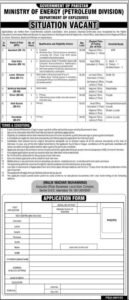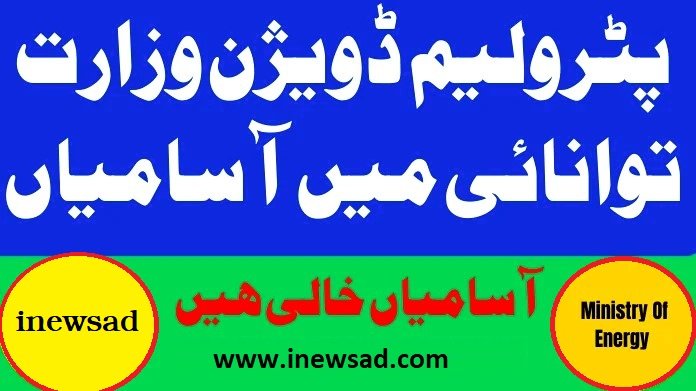The Petroleum Division of the Ministry of Energy in Pakistan plays a crucial role in managing and developing the country’s vast energy resources. Established to oversee the exploration, production, and regulation of oil and natural gas, the division is instrumental in ensuring energy security and promoting sustainable energy practices. Additionally, by coordinating with various stakeholders, such as governmental bodies, private enterprises, and international partners, the division effectively strategizes and implements initiatives to optimize resource utilization and enhance energy efficiency. Furthermore, through continuous research and innovation, the division remains at the forefront of technological advancements in the energy sector, facilitating the transition towards cleaner and more renewable energy sources. Additionally, it operates under the Ministry of Energy, which was formed in 2017 by merging the Ministries of Petroleum and Natural Resources, and Water and Power.
The Petroleum Division is tasked with formulating policies, implementing regulations, and fostering international collaborations to optimize the exploration and utilization of hydrocarbons. Consequently, its efforts are vital for powering Pakistan’s economy, supporting industrial growth, and meeting the energy demands of its burgeoning population. Moreover, through strategic initiatives and reforms, the Petroleum Division aims to enhance energy efficiency, attract foreign investment, and drive the transition towards a more diversified and sustainable energy sector.
History and Formation of Petroleum Division of the Ministry of Energy
In August 2017, the Ministry of Energy came into existence through the merger of the Ministries of Petroleum and Natural Resources and Water and Power. Consequently, this reorganization aimed to unify the country’s energy policies and operations under a single administrative structure. As a result of this merger, the Petroleum Division, as part of this ministry, inherited the mandate to manage and develop Pakistan’s oil and gas resources.
Mandate and Responsibilities at Petroleum Division
- Exploration and Production
The Petroleum Division oversees the exploration and production of oil and natural gas. In addition, it grants licenses, monitors compliance with regulatory standards, and promotes technological advancements in the sector. Consequently, by facilitating exploration activities, the division aims to discover new reserves and enhance domestic production.
- Policy Formulation
One of the primary functions of the Petroleum Division is to formulate policies related to the oil and gas sector. Consequently, these policies are designed to ensure energy security, promote sustainable practices, and create a favorable environment for investment.
- Regulation and Compliance
The division is responsible for regulating the petroleum industry in Pakistan. To achieve this, it ensures compliance with national and international standards, oversees the implementation of safety protocols, and manages environmental impacts associated with exploration and production activities. Furthermore, it collaborates closely with regulatory agencies to enforce stringent guidelines aimed at safeguarding public health and preserving natural ecosystems. Additionally, the division regularly conducts audits and inspections to monitor industry practices, identify potential risks, and recommend corrective measures. By fostering transparency and accountability, it strives to promote sustainable development and mitigate the adverse effects of petroleum operations on both local communities and the environment.
Strategic Initiatives
- Enhancing Energy Security
To reduce dependency on imported fuels, the Petroleum Division is focused on boosting domestic production through incentives for exploration and development. This includes facilitating foreign investments and collaborations with international oil companies.
- Promoting Sustainable Practices
The division emphasizes sustainable energy practices, including the development of cleaner fuel options and the adoption of environmentally friendly technologies. It works to balance economic growth with environmental stewardship.
- Infrastructure Development
Investment in infrastructure, such as pipelines, storage facilities, and refineries, is a critical focus area. The Petroleum Division seeks to modernize and expand the country’s energy infrastructure to support efficient supply chains and meet growing demand.
- International Collaboration
The Petroleum Division actively seeks partnerships with international stakeholders to bring in expertise, technology, and investment. Through bilateral and multilateral agreements, the division aims to foster global cooperation and secure strategic energy alliances.
Overview of Petroleum Division of the Ministry of Energy
The Petroleum Division is a key arm of Pakistan’s Ministry of Energy, focusing on the exploration, development, and regulation of the country’s petroleum and natural gas resources. It was established to streamline energy governance and enhance the efficiency and effectiveness of the energy sector in Pakistan.
- History and Formation
The Ministry of Energy was created in August 2017 through the merger of the Ministries of Petroleum and Natural Resources and Water and Power. This reorganization aimed to unify the country’s energy policies and operations under a single administrative structure. The Petroleum Division, as part of this ministry, inherited the mandate to manage and develop Pakistan’s oil and gas resources.
Mandate and Responsibilities
- Exploration and Production
The Petroleum Division oversees the exploration and production of oil and natural gas. It grants licenses, monitors compliance with regulatory standards, and promotes technological advancements in the sector. By facilitating exploration activities, the division aims to discover new reserves and enhance domestic production.
- Policy Formulation
One of the primary functions of the Petroleum Division is to formulate policies related to the oil and gas sector. These policies are designed to ensure energy security, promote sustainable practices, and create a favorable environment for investment.
- Regulation and Compliance
The division is responsible for regulating the petroleum industry in Pakistan. It ensures compliance with national and international standards, oversees the implementation of safety protocols, and manages environmental impacts associated with exploration and production activities.
Strategic Initiatives
- Enhancing Energy Security
To reduce dependency on imported fuels, the Petroleum Division is focused on boosting domestic production through incentives for exploration and development. This includes facilitating foreign investments and collaborations with international oil companies.
- Promoting Sustainable Practices
The division emphasizes sustainable energy practices, such as the development of cleaner fuel options and the adoption of environmentally friendly technologies. Additionally, it works to balance economic growth with environmental stewardship.
- Infrastructure Development
Investment in infrastructure, such as pipelines, storage facilities, and refineries, is a critical focus area. Additionally, the Petroleum Division seeks to modernize and expand the country’s energy infrastructure to support efficient supply chains and meet growing demand.
- International Collaboration
The Petroleum Division actively seeks partnerships with international stakeholders, consequently bringing in expertise, technology, and investment. Through bilateral and multilateral agreements, the division aims to foster global cooperation and secure strategic energy alliances.
Challenges and Future Outlook for Petroleum Division of the Ministry of Energy
- Meeting Demand
As Pakistan’s population and economy grow, the demand for energy continues to rise. The Petroleum Division faces the challenge of ensuring sufficient supply while managing the economic and environmental impacts of energy production.
- Energy Transition
In line with global trends, the division is also focused on facilitating the transition towards renewable energy sources. This includes integrating natural gas as a cleaner alternative in the interim and supporting research and development in renewable technologies.
- Policy Reforms
To keep pace with changing global energy dynamics, continuous policy reforms are essential. Therefore, the Petroleum Division is committed to updating regulatory frameworks and incentives, aiming to attract investment and encourage innovation in the sector.
Government of Pakistan
Ministry of Energy (Petroleum Division)
Department of Explosive
POSITIONS VACANT
The Department of Explosives invites applications from qualified candidates, both male and female, holding Degrees/Certificates recognized by the Higher Education Commission or relevant boards, for various positions on a regular basis at the Head Office in Islamabad and Regional Offices in Lahore, Peshawar, Quetta, and Multan.
Assistant (BS-15)
- Number of Posts: 1
- Qualifications and Eligibility: Graduate
- Age Limit: 18-28
- Posting Location: Regional Office, Peshawar (1-Post) (KPK)
- Requirements: Completion of a 6-week Basic Training Course (including MS Office) from NITB before the end of the probation period.
Data Entry Operator (BS-14)
- Number of Posts: 3
- Qualifications and Eligibility: Second class or Grade “C” Bachelor’s degree in Computer Science, Statistics, Mathematics, or Physics
- Age Limit: 18-25
- Posting Locations: Head Office, Sindh (R) Islamabad (1 Post) Regional Office, Punjab Lahore (1 Post)
- Quota:
- Punjab: 1
- Baluchistan: 1
- Additional Requirement: With a minimum typing speed requirement of 10,000 key depressions per hour for data entry/verification, efficiency and accuracy are prioritized in handling data-related tasks. Additionally, this criterion ensures that candidates possess the necessary skills to effectively manage large volumes of data within tight deadlines.
Lower Division Clerk (BS-11)
- Number of Posts: 2
- Qualifications and Eligibility: Matriculation with a typing speed of 30 w.p.m.
- Age Limit: 18-25
- Posting Location: Head Office, Islamabad (3-Posts)
- Quota:
- Merit: 1
- Punjab: 1
- Baluchistan: 1
- Additional Requirement: Completion of a 3-week Basic Training Course (including MS Office) from NITB before the end of the probation period.
Technical Assistant (BS-08)
- Number of Posts: 1
- Qualifications and Eligibility: Matriculation
- Age Limit: 18-25
- Posting Location: Regional Office, Baluchistan Quetta (1 Post)
Driver (BS-04)
- Number of Posts: 1
- Qualifications and Eligibility: Primary education
- Age Limit: 18-30
- Posting Location: Regional Office, Punjab Multan (1 Post)
- Requirements: Valid driving license and knowledge of traffic rules.
Naib Qasid (BS-01)
- Number of Posts: 2
- Qualifications and Eligibility: Primary education
- Age Limit: 18-25
- Posting Locations: Head Office, Rawalpindi/Islamabad (1 Post) (Local) Regional Office, Multan (1 Post) (Local)
Chowkidar (BS-01)
- Number of Posts: 1
- Qualifications and Eligibility: Primary education
- Age Limit: 18-25
- Posting Location: Regional Office, Lahore (1 Post) (Local)
Ministry of Energy (Petroleum Division) Terms & Condition:
- A general relaxation of 5 years in the upper age limit will be applicable in accordance with existing Government rules.
- Age will be computed from the last date of application submission. Furthermore, eligibility criteria will determine candidates’ academic qualifications and age specified for each position.
- Each candidate can apply for multiple positions by submitting separate application forms for each.
- During the interview, candidates must present their original documents along with attested copies. Additionally, if any provided information is found to be false or bogus, the candidacy will be revoked, and legal action will ensue.
- Government employees must apply through proper channels and furnish a NOC during the interview. Incomplete applications or those received after the deadline will not be considered.
- No TA/DA will be provided for the test/interview.
- Shortlisted candidates will receive contact for the test/interview. Moreover, the recruitment team will notify solely those applicants who have been selected for further assessment.
- The appointing authority reserves the right to cancel or postpone the recruitment process at any stage.
- Mobile phones and electronic devices, including calculators and headphones, are prohibited in the test center premises.
- The deadline for application submission via the National Job Portal is set for 15 days from the publication date of the advertisement.
- Applications must be submitted through the National Job Portal nip.gov.pk.
- Applicants must submit the provided proforma (without educational documents) with legible handwriting to the following address:
TEST CENTRE FOR PETROLEUM ENERGY DIVISION (Select One):
- Islamabad
- Lahore
- Karachi
- Peshawar
- Quetta
- Multan
Address:
MALIK MAZHAR MUHAMMAD
Accounts Officer
Basement, Local Govt. Complex, Sector G-5/2, Islamabad
Tel: (051)9245567
OFFICAL ADVERTISEMENT

